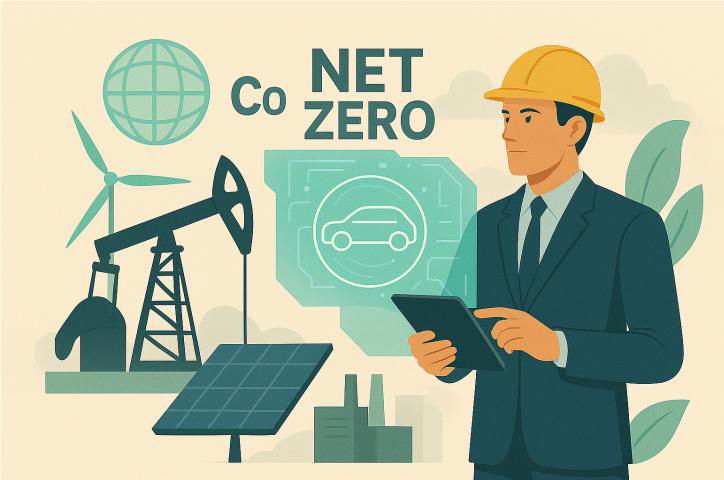Energy Transition: The Future of Petroleum Engineering in a Net - Zero World

The global energy sector is experiencing a significant shift. The pressing need for sustainability is reshaping sectors as countries pledge to meet net-zero carbon ambitions. Petroleum engineering, a field historically linked to fossil fuels, is at the forefront of this shift, adopting decarbonization, greener technology, and creative energy solutions.
The Evolution of Petroleum Engineering's Function
Hydrocarbon exploration and production are no longer the only activities available to petroleum engineers. They are in a unique position to handle some of the most difficult problems in the energy transition because of their proficiency in subsurface research, reservoir management, fluid dynamics, and large-scale project execution. Important areas of attention include:
· Carbon Capture, Utilization, and Storage (CCUS): To safely inject and store CO2 underground, petroleum engineers develop and optimize storage locations.
· Production and Storage of Hydrogen: Hydrogen is a clean fuel of the future that can be produced and stored using skills directly transferred from gas production and transportation.
· Geothermal Energy: Geothermal systems can be created as a renewable substitute by employing reservoir and petroleum drilling techniques.
· Minimizing Environmental Footprints: Innovation in production, drilling, and reservoir stimulation is resulting in safer operations, reduced emissions, and less water use.
The Trilemma of Energy and Net-Zero
Reaching net-zero requires striking a balance between three essential demands, not merely replacing gas and oil:
· Ensuring consistent and reasonably priced energy availability is known as energy security.
· Sustainability is the reduction of emissions and harm to the environment.
· Economic growth promotes jobs, industries, and the advancement of the country.
Petroleum engineers are in a great position to handle this energy conundrum, using cutting edge technology to satisfy present demands while influencing low-carbon solutions of the future.
The Role of Presidency University
We at Presidency University understand how critical it is to train engineers for this changing energy landscape. In addition to teaching students the traditional oil and gas technology, our Petroleum Engineering and Energy Studies programs aim to give them skills that will be useful in the future.
Among the major projects are:
· Students study the physics, engineering, and policy aspects of safely storing CO2 in Carbon Capture and Storage (CCS) modules.
· Courses on environmental issues, including lifecycle emissions assessments, and sustainable reservoir management.
· Students can combine environmental sciences, renewable energy systems, and petroleum engineering through interdisciplinary projects.
· Platforms for research and innovation that support student-led approaches to energy efficiency and sustainable energy technologies.
Presidency University is making sure that its graduates become not just petroleum engineers but also sustainability leaders capable of spearheading the global shift to a net-zero future by integrating these issues into the curriculum. Petroleum engineering's future depends on innovation and adaptation. The engineers of today will shape tomorrow's energy systems as we usher in this new era. We are honoured to be a part of this change at Presidency University, developing talent, advancing research, and influencing the direction of energy in a net-zero world.
Written by,
Mr. Hamid Hassan
Assistant Professor, Dept. of Petroleum Engineering
Presidency School of Engineering













 Rajanukunte, Yelahanka, Bengaluru, Karnataka, Pin: 560119, India
Rajanukunte, Yelahanka, Bengaluru, Karnataka, Pin: 560119, India
 +91 9022092222
+91 9022092222